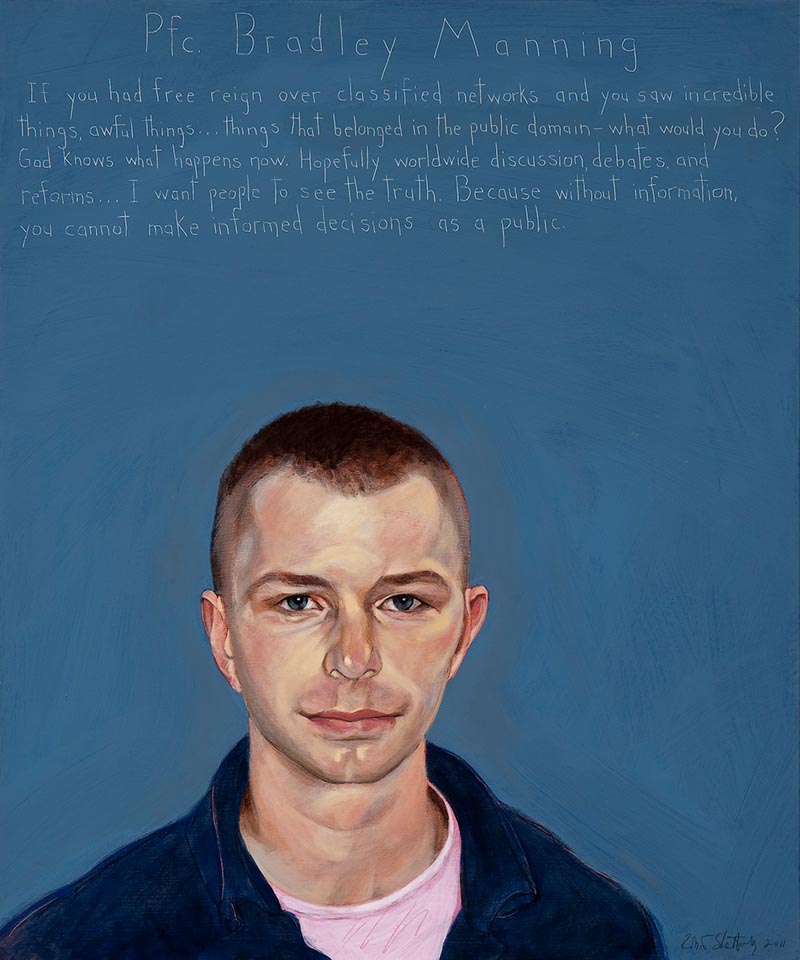
Chelsea (Bradley) Manning
US Army Intelligence Analyst, Whistleblower : b.1987
“If you had free reign over classified networks and you saw incredible things, awful things… things that belonged in the public domain — what would you do? God knows what happens now. Hopefully worldwide discussion, debates, and reforms… I want people to see the truth. Because without information, you cannot make informed decisions as a public.”
Biography
2014 recipient of the Sam Adams Award for Integrity in Intelligence.
2013 Nobel Peace Prize nominee.
2013 recipient of the US Peace Memorial Peace Prize.
2013 recipient of the International Peace Bureau´s Sean MacBride Peace Prize.
August 2013, Manning announces gender change and chooses to go by the name Chelsea.
US Army intelligence analyst Chelsea Manning (born Bradley Edward Manning) had access to classified information that deeply disturbed her conscience. When she released it to the online organization WikiLeaks, she was arrested, subjected to treatment widely considered to be torture, and faced life in prison if found guilty of “aiding the enemy,” the most serious of the 34 charges against her.
Included in the leaked information is a video that has been dubbed “Collateral Murder,” which shows US military personnel killing suspected but apparently unarmed insurgents, as well as two Reuters journalists.
Also included are thousands of classified documents detailing American actions around the globe: “Crazy, almost criminal political backdealings … the non-PR-versions of world events and crises … all kinds of stuff, like everything from the buildup to the Iraq War… to what the actual content of ‘aid packages’ is … There’s so much … it affects everybody on earth … Everywhere there’s a US post … there’s a diplomatic scandal,” wrote Manning in an online chat.
Manning was held for several weeks after her May 2010 arrest without being charged with a crime. Without a trial or conviction, she was placed in “Maximum Custody,” the military’s most restrictive form of detention. Allowed only one hour of free movement per day, Manning was held at a Marine base in Quantico, Virginia, in what amounted to solitary confinement—without a pillow, blanket or clothing at night—for 10 months. She wrote in a letter to her attorney that she was also subjected to humiliating forced nudity for morning inspection and was harassed by her guards. Manning was not fully charged until March of 2011.
Manning’s treatment at Quantico spurred protest worldwide, including a request by a United Nations torture investigator to meet privately with Manning to determine her condition. The request was denied, but she was transferred to a military prison in Leavenworth, Kansas, where conditions were less restrictive.
Many, including US Congressman Dennis Kucinich, consider Manning’s solitary confinement a violation of the Eighth Amendment of the Constitution, which forbids cruel and unusual punishment.
Though much of the media coverage of Manning’s act paints her as an unstable misfit, she can perhaps more accurately be seen as an ordinary young person in extraordinary circumstances.
Like many young people, growing up was difficult for Manning. She was small compared to other children her age and gender non-conforming, and she faced challenges both inside and outside her home.
Manning excelled at school and science fairs, preferred computers to sports. She was teased and bullied in public school and later picked on and assaulted in the Army.
Before joining the military, Manning had tried to further her education in community college but had to work several jobs at the same time and wound up dropping out. Manning joined the Army at her father’s urging and intended to use her veteran’s benefits to go to college someday. She wrote in an online chat that she hoped to get a doctorate if she was “smart enough.”
Manning’s closest childhood friend described her as someone who “loved America.” Before all this happened to her, Manning wrote online: “… Maybe I’m just young, naive, and stupid … [but] I want people to see the truth … regardless of who they are.”
November 2020 update:
In 2013, Manning pleaded guilty to some of the charges against her and was convicted of others but was acquitted of aiding the enemy.
The day after her sentencing, Manning’s attorney publicly announced that Manning identified as female and chose to be called Chelsea.
In 2017, President Obama commuted Manning’s sentence to her past seven years of confinement and she was released.
In 2018, Manning launched an unsuccessful challenge to incumbent Senator Ben Cardin for the Democratic nomination for United States Senate in her home state of Maryland.
In March 2019, Manning was jailed for contempt and accrued a civil fine of $256,000 for refusing to testify before a grand jury investigating WikiLeaks founder Julian Assange. She was released about a year later, and a crowdfunding effort raised the money to satisfy her fine.
Since her 2017 release, Manning has continued to receive awards for her work, including:
• the Electronic Frontier Foundation’s Pioneer Award in recognition of her actions as a whistleblower and for her work as an advocate for government transparency and transgender rights (September 2017)
• Foreign Policy’s 2017 Global Thinkers designation “for forcing the United States to question who is a traitor and who is a hero.”
• European United Left–Nordic Green Left (GUE/NGL) prize for Journalists, Whistleblowers and Defenders of the Right to Information (October 2020).
Programs
Americans Who Tell the Truth (AWTT) offers a variety of ways to engage with its portraits and portrait subjects. Host an exhibit, use our free lesson plans and educational programs, or engage with a member of the AWTT team or portrait subjects.

Education
AWTT has educational materials and lesson plans that ask students to grapple with truth, justice, and freedom.

Exhibits & Community Engagement
AWTT encourages community engagement programs and exhibits accompanied by public events that stimulate dialogue around citizenship, education, and activism.